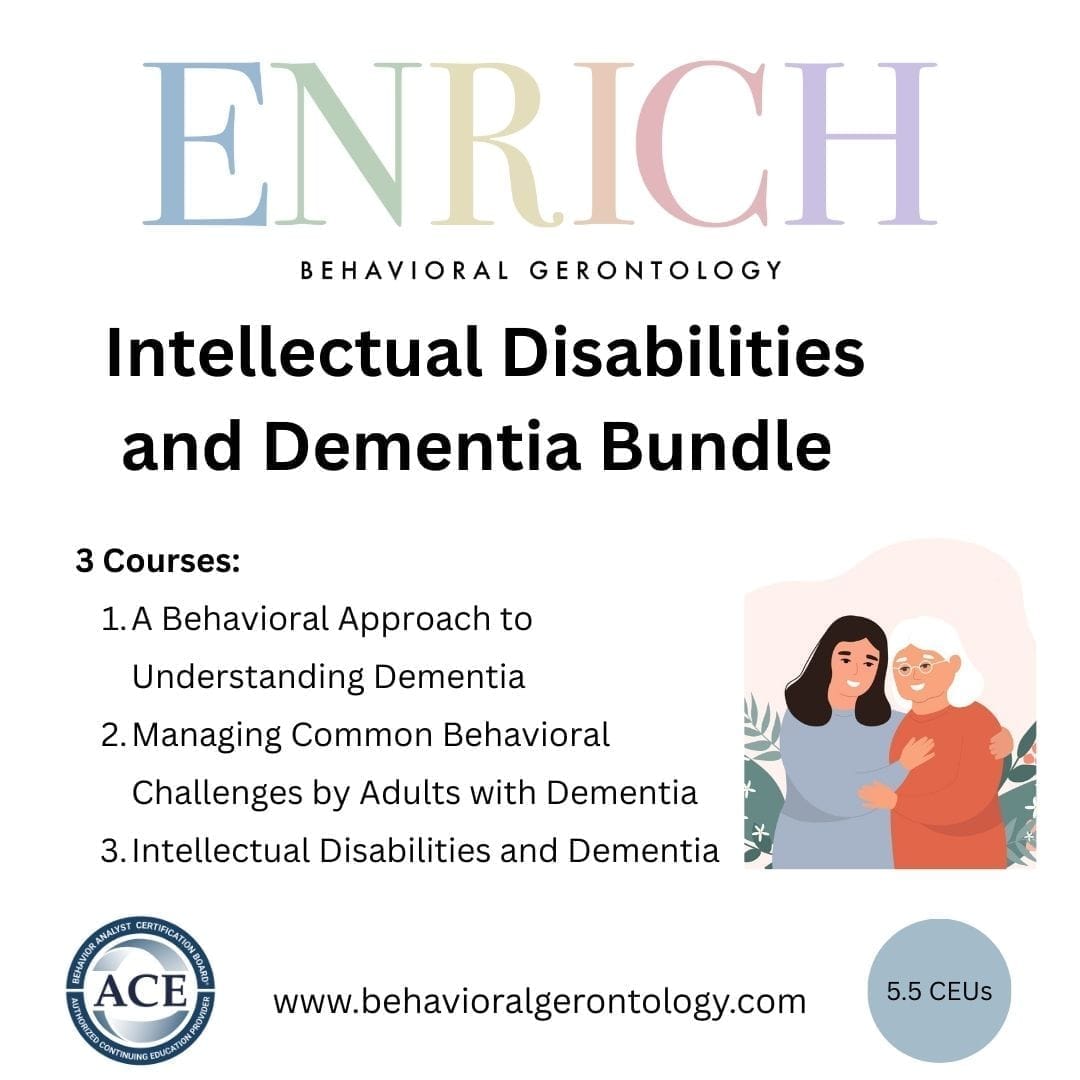ONLINE CEU COURSE
Intellectual Disabilities and Dementia
In this course, you'll gain a deep understanding of the nature of dementia in people with an intellectual disability, how dementia presents differently in individuals with an intellectual disability, and how they are at increased risk.
Through in-depth content and research, including data from Dr. Lucock’s PhD, you’ll learn how to recognize early symptoms, navigate the diagnostic process, and implement behavior-based strategies rooted in current literature. The course also explores key research studies, including the seminal Lucock et al. (2018) review, and offers practical guidance for improving your care of adults with intellectual disabilities aged 30+.
By the end, you'll be equipped with the knowledge and tools to provide compassionate, informed care - transforming outcomes for one of the most underserved populations in the field. Enroll now and take your practice to the next level.


Learn how to work with this population
Vital knowledge for any Behavior Analyst working with adults with ID aged 30+ on how to recognise and monitor for signs of dementia and how to change your practice to provide best outcomes for this population.

Complete at your own pace in bite-size videos online
Everything is completed online in short videos to keep your attention and break up learning.

Earn CEUs
As an ACE provider, this course from Enrich Behavioral Gerontology will provide you with 2.5 BACB Learning CEUs.
About the course
Gain the specialized knowledge and skills needed to support one of the most underserved and complex populations - older adults with intellectual disabilities (ID) who are developing or diagnosed with dementia. This in-depth course is designed specifically for Behavior Analysts seeking to provide more informed, and effective care to older individuals with intellectual disabilities (aged 30+) who are at risk of developing dementia.
Through this course, you’ll:
Explore the prevalence of dementia in individuals with intellectual disabilities and how these rates differ from those seen in typically developing older adults. You’ll gain a deeper understanding of why certain populations are at greater risk and at what age they are more likely to show signs of dementia.
Learn to recognize the early and ongoing symptoms of dementia in individuals with ID, including how these symptoms may present differently than in the general population. You’ll discover which signs and behaviors should be closely monitored and what other causes of symptoms should be ruled out.
Understand the diagnostic process for dementia in individuals with ID, including the unique challenges it presents. You’ll learn the role of the Behavior Analyst in this process and how to provide support throughout the diagnosis journey.
Understand the Lucock et al. (2018) literature review, which highlights the current state of behavioral research focused on adults with intellectual disabilities and dementia. You’ll delve into this foundational review to understand the breadth of the literature base.
Study six behavioral research studies that have investigated how behavioral strategies can support individuals with ID and dementia. These examples give you a flavour of the type of work that has been done with people with ID and dementia.
Gain an understanding of preference displacement research as an example of one area of future research with older adults with ID and dementia. See real data from participants in Dr Lucock's PhD.
Take away actionable recommendations from Dr. Lucock, who offers guidance on what Behavior Analysts should be doing to support adults with ID and dementia effectively. From assessment to intervention, you’ll learn how to align your work with best practices grounded in current research.
By the end of this course, you'll be equipped with both the theoretical understanding and practical tools to improve the lives of individuals with intellectual disabilities and dementia.
What others are saying...

Shawna
"This course offered an engaging and well-structured exploration of a complex and important topic. The sequence of content was thoughtfully organized, making it easy to follow and build upon foundational knowledge. I especially appreciated the thorough review of the literature — it was both informative and thought-provoking, offering valuable insights into current research and best practices."


Lauren
"Thank you for these CEUs. I am working with my first client with Down syndrome and Alzheimer's and your courses have been so valuable."


Elaine
"The information presented was an eye opener. I learned so much about Downs Syndrome too that I didn't know previously."

About your Instructor
Dr. Zoe Lucock is a behavioral gerontologist dedicated to integrating behavior-analytic services into mainstream older adult care. With a passion for enriching the lives of older adults, she has published research in journals such as the Journal of Applied Behavior Analysis, Behavior Analysis: Research and Practice and Behavior Analysis in Practice.
As Chair of the ABAI Behavioral Gerontology Special Interest Group, Dr. Lucock has led the development of webinars and resources to expand the field’s reach. She is also a frequent speaker at conferences such as ABAI and EABG, presenting on dementia, learning disabilities and dementia, and ethical issues in behavioral gerontology.
With a Ph.D. in behavioral gerontology and experience founding the UK’s first behavioral gerontology service provision, Dr. Lucock brings a wealth of research and clinical expertise. She is also a fellow of the Higher Education Academy showing excellence in teaching in higher education and has taught students in behavior analysis at both undergraduate and postgraduate level.
Her passion project, Enrich Behavioral Gerontology, allows her to share this knowledge with others who want to make a difference in the lives of older adults.

Buy the Course

Buy the course
Get the Intellectual Disabilities and Dementia Course
$45
2.5 CEUs upon completion
Intellectual Disabilities and Dementia course

Want to learn more?
Get 3 courses and save $$!
$105$90
5.5 CEUs upon completion
A Behavioral Approach to Understanding Dementia Course
Managing Common Behavioral Challenges by Adults with Dementia Course
Intellectual Disabilities and Dementia Course
Includes the prerequisite course for the Intellectual Disabilities and Dementia Course
Got questions?
BCBAs/BCaBAs/RBTs/UKBA(Cert)s who work with adults with intellectual disabilities who are aged 30 or older.
You have 90 days from purchasing the course to complete it. This is a limited hold schedule to ensure you complete it!
Yes! Enrich Behavioral Gerontology is a BACB authorised ACE provider, and this course is worth 2.5 BCBA learning CEUs.
When you have completed the course, you will receive an email with your certificate attached. Remember to enter your BACB ID number when you sign up!
These CEUs are also suitable for renewing your UKSBA membership.
I estimate that the course will take roughly 2.5 hours to complete from start to finish including completing the quizzes to test your understanding.
Please ensure you have taken the A Behavioral Approach to Understanding Dementia Course first- this is funadmental understanding regarding people with dementia and this course builds upon that knowledge.
Definitely! You don't need to be certified to want to learn more about ABA with older adults with intellectual disabilities. Many masters degrees in ABA don't have any content about this niche area, so seeking out additional learning beyond the course curriculum is a great way to develop your skills as a behavior analyst.
Absolutely! This course is available to anyone in the world as I don't think it would be right to restrict access. The content is suitable for Behavior Analysts interested in behavioral gerontology no matter where you live and work. I try to use American spellings wherever possible but as a British Behavior Analyst, I do sometimes forget and slip into British English spellings :)
All courses are paid for via PayPal, credit card (Stripe), or Apple Pay so you have peace of mind that your details are protected.
